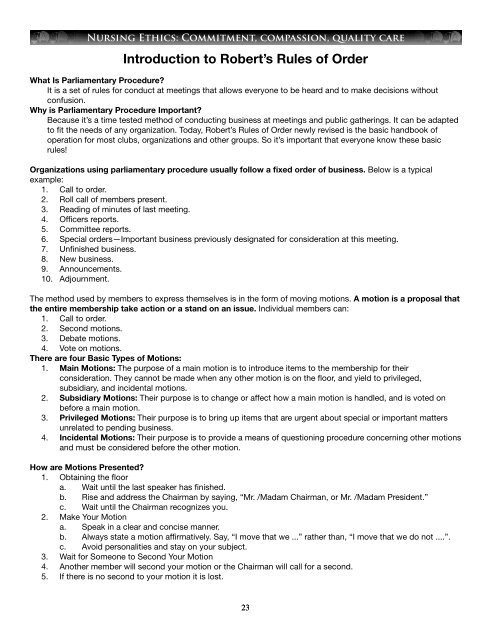You also want an ePaper? Increase the reach of your titles
YUMPU automatically turns print PDFs into web optimized ePapers that Google loves.
Nursing Ethics: Commitment, compassion, quality care<br />
Introduction to Robert’s Rules of Order<br />
What Is Parliamentary Procedure?<br />
It is a set of rules for conduct at meetings that allows everyone to be heard and to make decisions without<br />
confusion.<br />
Why is Parliamentary Procedure Important?<br />
Because it’s a time tested method of conducting business at meetings and public gatherings. It can be adapted<br />
to fit the needs of any organization. Today, Robert’s Rules of Order newly revised is the basic handbook of<br />
operation for most clubs, organizations and other groups. So it’s important that everyone know these basic<br />
rules!<br />
Organizations using parliamentary procedure usually follow a fixed order of business. Below is a typical<br />
example:<br />
1. Call to order.<br />
2. Roll call of members present.<br />
3. Reading of minutes of last meeting.<br />
4. Officers reports.<br />
5. Committee reports.<br />
6. Special orders—Important business previously designated for consideration at this meeting.<br />
7. Unfinished business.<br />
8. New business.<br />
9. Announcements.<br />
10. Adjournment.<br />
The method used by members to express themselves is in the form of moving motions. A motion is a proposal that<br />
the entire membership take action or a stand on an issue. Individual members can:<br />
1. Call to order.<br />
2. Second motions.<br />
3. Debate motions.<br />
4. Vote on motions.<br />
There are four Basic Types of Motions:<br />
1. Main Motions: The purpose of a main motion is to introduce items to the membership for their<br />
consideration. They cannot be made when any other motion is on the floor, and yield to privileged,<br />
subsidiary, and incidental motions.<br />
2. Subsidiary Motions: Their purpose is to change or affect how a main motion is handled, and is voted on<br />
before a main motion.<br />
3. Privileged Motions: Their purpose is to bring up items that are urgent about special or important matters<br />
unrelated to pending business.<br />
4. Incidental Motions: Their purpose is to provide a means of questioning procedure concerning other motions<br />
and must be considered before the other motion.<br />
How are Motions Presented?<br />
1. Obtaining the floor<br />
a. Wait until the last speaker has finished.<br />
b. Rise and address the Chairman by saying, “Mr. /Madam Chairman, or Mr. /Madam President.”<br />
c. Wait until the Chairman recognizes you.<br />
2. Make Your Motion<br />
a. Speak in a clear and concise manner.<br />
b. Always state a motion affirmatively. Say, “I move that we ...” rather than, “I move that we do not ....”.<br />
c. Avoid personalities and stay on your subject.<br />
3. Wait for Someone to Second Your Motion<br />
4. Another member will second your motion or the Chairman will call for a second.<br />
5. If there is no second to your motion it is lost.<br />
23

















